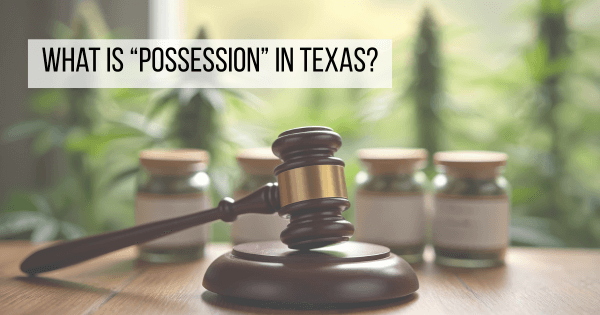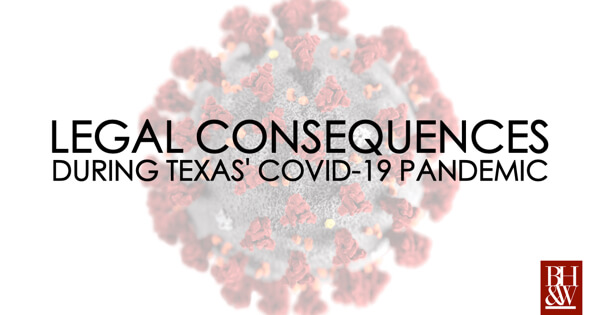
In Texas, the concept of “possession” can sometimes be a little tricky when we think about it in terms of the law as opposed to what we all commonly define as “possession”. Whether it’s related to controlled substances, firearms, or stolen property, possession is a key element in many criminal offenses. But what does possession actually mean in the eyes of Texas law? This post will break down the definition, legal standards, and consequences of possession in the Lone Star State.
Definition of Possession in Texas Law
Under Texas Penal Code §1.07(a)(39), possession is defined as having “actual care, custody, control, or management.” This broad definition means that possession isn’t limited to physical ownership. Instead, it can include situations where a person has any access to or control over an object, even if they don’t physically hold it at the moment.
Possession can be categorized into two types:
- Actual Possession: This occurs when the individual has physical custody of the item. For instance, if someone is holding a bag containing illegal drugs, they are in actual possession.
- Constructive Possession: This arises when an individual does not have physical custody but still has control or the right or ability to excersise control the item. For example, if illegal drugs are found in the glove compartment of a car that a person owns and operates, they may be deemed to have constructive possession. Even if they don’t own or are operating the vehicle, police officer’s may deem a passenger in the vehicle as having the ability to exercise care, custody, control or management of the illegal item.
Establishing Possession in a Criminal Case
To prove possession in a criminal case, the prosecution must demonstrate two key elements:
- Knowledge: The accused must have known about the presence of the item, and;
- Control: The accused must have exercised, or had the ability to exercise, control over the item.
Merely being near an illegal item is not enough to establish possession. For example, if drugs are found in a house shared by multiple roommates, the prosecution must show evidence linking the accused to the drugs specifically—such as fingerprints, ownership of the container, or incriminating statements.
Joint Possession
Texas law also recognizes the concept of joint possession. This means that more than one person can be found to have possession of the same item. For example, if two people are in a vehicle and illegal contraband is found in a location accessible to both, they could both potentially be charged with possession.
Consequences of Possession Charges
Possession charges can carry serious consequences in Texas, varying based on the type and quantity of the item in question. For instance:
- Drug Possession: Penalties depend on the type of drug and the amount, with punishments ranging from misdemeanors to first-degree felonies.
- Firearm Possession: Certain individuals, such as convicted felons, are prohibited from possessing firearms, and violating this prohibition can result in severe penalties.
- Stolen Property: Possession of stolen property can lead to theft charges, with penalties depending on the value of the property.
Defenses to Possession Charges
There are several potential defenses to possession charges in Texas, including:
- Lack of Knowledge: Demonstrating that the accused was unaware of the item’s presence.
- Lack of Control: Arguing that the accused did not have the ability to exercise control over the item.
- Mistaken Identity: Showing that the item belonged to someone else and the accused had no connection to it.
- Violation of Constitutional Rights: If law enforcement obtained evidence through an illegal search or seizure, that evidence may be suppressed.
Conclusion
“Possession” is a nuanced legal concept in Texas, encompassing both actual and constructive control over items. Understanding the intricacies of possession is crucial for anyone facing criminal charges. What you think may or may not be possession may be different than what the law defines it as. If you or someone you know is dealing with a possession-related charge, consulting an experienced criminal defense attorney is essential to ensure your rights are protected and to navigate the complexities of the legal system effectively.



 Texas law sets out the statute of limitations, the period during which formal charges must be brought against a defendant for most offenses. These time periods range from two years to over twenty years, and for some offenses there is no limitation period at all. The applicable limitation period depends on the particular offense that is alleged.
Texas law sets out the statute of limitations, the period during which formal charges must be brought against a defendant for most offenses. These time periods range from two years to over twenty years, and for some offenses there is no limitation period at all. The applicable limitation period depends on the particular offense that is alleged.
 Throughout the year, package thefts occur on a fairly regular basis. But, as Christmas draws near and package delivery increases, so too do the thefts. While packages left on doorsteps and out in the open may seem to be easy targets for thieves, the consequences of getting caught are rarely considered. Would-be porch pirates should certainly think through their intended capers as many houses are equipped with doorbell cameras these days that capture clear video of any movement at or near the doorway.
Throughout the year, package thefts occur on a fairly regular basis. But, as Christmas draws near and package delivery increases, so too do the thefts. While packages left on doorsteps and out in the open may seem to be easy targets for thieves, the consequences of getting caught are rarely considered. Would-be porch pirates should certainly think through their intended capers as many houses are equipped with doorbell cameras these days that capture clear video of any movement at or near the doorway.
 Independence Day is right around the corner. You will probably start seeing the notices spread across social media from local police departments, warning that setting off fireworks (including sparklers) is illegal inside of city limits. We know that you’re probably going to do it anyway (so are we), but we wanted to let you know what Texas law provides regarding fireworks on the 4th of July.
Independence Day is right around the corner. You will probably start seeing the notices spread across social media from local police departments, warning that setting off fireworks (including sparklers) is illegal inside of city limits. We know that you’re probably going to do it anyway (so are we), but we wanted to let you know what Texas law provides regarding fireworks on the 4th of July.
 Texas law is clear that every driver must maintain financial responsibility (auto insurance). But, the truth of the matter is that there are thousands of drivers on Texas roads who are underinsured with a minimum policy or not insured at all. What this means is that if you are hit and injured in a car wreck by one of these uninsured or underinsured drivers, you may have to use your own insurance to pay for your medical bills, lost wages, lost ability to work and/or other damages.
Texas law is clear that every driver must maintain financial responsibility (auto insurance). But, the truth of the matter is that there are thousands of drivers on Texas roads who are underinsured with a minimum policy or not insured at all. What this means is that if you are hit and injured in a car wreck by one of these uninsured or underinsured drivers, you may have to use your own insurance to pay for your medical bills, lost wages, lost ability to work and/or other damages.

 Many people involved in motor vehicle collisions may not have police or accident reports documenting the specifics of the wreck. Sometimes it could be because the wreck was not reported and the police were never called. Other times, the police may have been called but simply did not respond. Law enforcement agencies often lack the resources to respond to each and every car wreck that occurs in their jurisdiction. More and more police agencies are putting policies into place that do not require them to respond to what the agency deems a “minor” wreck. The problem is that sometimes a wreck that law enforcement deems “minor” may actually have major long-term consequences (and injuries) for the individuals involved.
Many people involved in motor vehicle collisions may not have police or accident reports documenting the specifics of the wreck. Sometimes it could be because the wreck was not reported and the police were never called. Other times, the police may have been called but simply did not respond. Law enforcement agencies often lack the resources to respond to each and every car wreck that occurs in their jurisdiction. More and more police agencies are putting policies into place that do not require them to respond to what the agency deems a “minor” wreck. The problem is that sometimes a wreck that law enforcement deems “minor” may actually have major long-term consequences (and injuries) for the individuals involved.
 With the declaration of a state of disaster in Texas by Governor Greg Abbott on March 13,2020 comes some new consequences that Texas citizens need to be aware of.
With the declaration of a state of disaster in Texas by Governor Greg Abbott on March 13,2020 comes some new consequences that Texas citizens need to be aware of.
 On March 13, 2020,
On March 13, 2020, 
 On June 10, 2019, Gov. Abbot signed
On June 10, 2019, Gov. Abbot signed 
 CBD Oil, which is short for cannabidiol oil, is a cannabinoid extract that is
CBD Oil, which is short for cannabidiol oil, is a cannabinoid extract that is 





